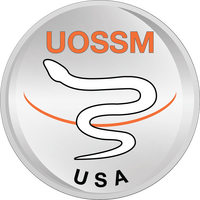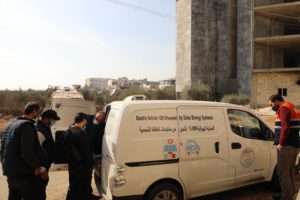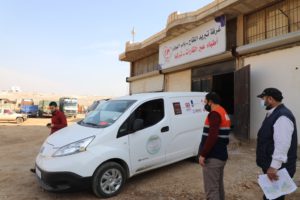Edinburg, TX – UOSSM launched the first electric vehicle in northern Syria. The vehicle will be used primarily for health services including vaccine transport between cold rooms and primary healthcare facilities, and to transport patients as part of the referral system.
Over a decade of ongoing conflict has left over 4 million people in northern Syria without access to critical health services. Aerial bombardment has destroyed healthcare and energy infrastructure, leaving civilians and healthcare workers to rely on diesel fuel, creating a cycle of dependency, fragility, and further contributes to conflict.
To address this challenge, a humanitarian innovation by Union of Medical Care and Relief Organizations (UOSSM) has successfully launched under the new Health System Resilience program in northern Syria. The electric vehicle otherwise known as, ‘ electrification of mobility,’ will be used primarily for health services including vaccine transport between cold rooms and primary healthcare facilities, and to transport patients as part of the referral system. The 100% solar-powered vehicle reduces dependency on fuel, while ensuring critical health services can run 24/7 in one of the most fragile settings. The expected metrics and outcomes of the pilot project will show its importance in improving and saving lives as it will be used for medical purposes and non-reliant on fuel- providing medical access in situations such as shortage of fuel in the area.
The 100% electric vehicle (EV) uses a lithium battery charged at health facilities powered by solar energy. The electric vehicle is expected to result in significant savings in the long term by reducing reliance on fuel, and strengthening and localizing the health system. In remote and conflict affected areas, health systems including hospitals and ambulances rely on diesel fuel for generating electricity and running mobile ambulatory services. However, in conflict zones, fuel is often a scarce resource and health centers, and hospitals are often under-resourced. UOSSM’s electric vehicle bypasses such challenges, delivering
life-saving medicines and healthcare using only solar energy.
The innovative project will help fill a critical gap where over 10 years of conflict in Syria has devastated health systems and energy infrastructure. The deployment of the electric vehicle is part of a broader project called the Health Integrated Resilience System (HIRS), and an extension of the “Syria Solar Initiative (SSI)” pioneered by UOSSM’s technical team focused on health system resilience, and is funded by Creating Hope in Conflict: a Humanitarian Grand Challenge (HGC). UOSSM’s HIRS project aims to combine electric mobility, solar power, and telemedicine to increase cross-dimensional resilience for the health system and to deliver critical services in the most challenging conflict zones, and works towards building strong, independent and resilient health systems – humanizing technological advancements for the people who need it most.
Ali Mohamad, UOSSM Environmental Engineer and Program Coordinator said, “At the Syria Solar Initiative (SSI), our ambition is to help mainstream such integrated approaches for resilience in similar contexts around the world. Our team is composed of highly qualified engineers and doctors, working together to advance this project. Our goal is to issue a report in the summer of 2022 which captures the results of this pilot project, and the HIRS approach more broadly with hopes that humanitarian practitioners and innovators can further build on this experience.”
Currently, UOSSM technical teams are evaluating the pilot project from different aspects (technical, economic, and logistical feasibility), with expected results that may transform future operations of health services in areas of crisis and war throughout the world – especially in light of the urgency to meet climate goals for deep decarbonization.
Where over 10 years of conflict in Syria has devastated health systems and energy infrastructure, UOSSM ‘s Health Integrated Resilience System works towards strong, independent, and resilient health systems, humanizing technological advancements for the people who need it most.
UOSSM aims to advance the adoption of renewable energy for critical health services, EVs as the primary mode of mobility, telemedicine which addresses the deep gap for health workers in the country. More technologies will be used in the future under the Health System Resilience Program not only for Syria, but for other similar humanitarian contexts.
Watch the video to learn more!
Click here to learn more about our work!




